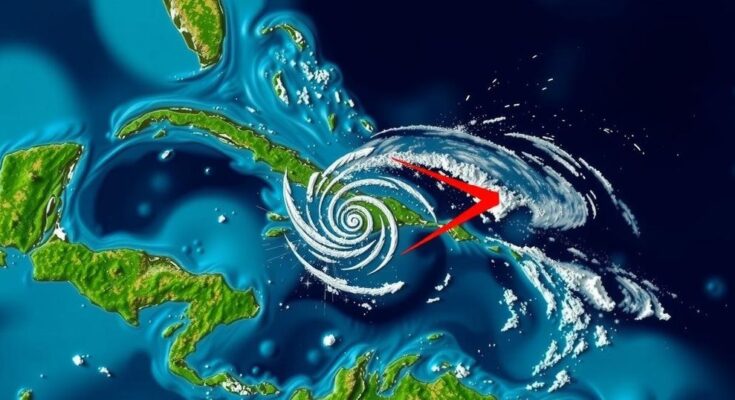Tropical Storm Oscar, which intensified unexpectedly into a Category 1 hurricane, has moved towards the Bahamas after making landfall in Cuba, resulting in at least six fatalities. The storm, characterized as barely a tropical storm at present, is expected to bring significant rainfall to the Bahamas. Experts have expressed concern over forecasting inaccuracies, given Oscar’s historical status as the smallest recorded hurricane. Forecasts predict an active Atlantic hurricane season influenced by warmer ocean temperatures.
Tropical Storm Oscar is currently advancing towards the Bahamas after making landfall in Cuba as a Category 1 hurricane, which resulted in the tragic loss of at least six lives due to the storm’s severe impact. The storm was located approximately 45 miles southeast of Long Island in the Bahamas with sustained winds of 40 mph and was progressing north-northeast at 12 mph, as reported by the National Hurricane Center in Miami. At this stage, the National Hurricane Center described Oscar as barely a tropical storm. However, the storm is projected to bring heavy rainfall, with forecasts suggesting up to 5 inches in the southeastern Bahamas and isolated areas potentially receiving as much as 8 inches. A tropical storm warning has been issued for the central and southeastern Bahamas. Interestingly, Oscar has made history as the smallest recorded hurricane, possessing a wind field of only about 6 miles in diameter. Its formation and subsequent intensification into a hurricane took many experts by surprise, as no predictive models had indicated such an outcome in their forecasts. Michael Lowry, a specialist in hurricanes and storm surge, remarked on this anomaly, saying, “It’s not often we see a colossal failure in hurricane forecasting.” During its time over Cuba, Oscar unleashed considerable rainfall, with some areas receiving over 15 inches, raising concerns about severe flooding and landslides. The fatalities occurred in Guantánamo, adding to Cuba’s hardships, which were compounded by a recent massive power blackout that had already sparked protests and warnings from government authorities. Oscar marks the 15th named storm and the 10th hurricane thus far in the Atlantic hurricane season, which runs from June 1 through November 30. The National Oceanic and Atmospheric Administration has forecasted an above-average hurricane season due to record-warm ocean temperatures, predicting between 17 to 25 named storms and four to seven major hurricanes of Category 3 or higher. Additionally, Tropical Storm Kristy is currently being monitored in the Pacific Ocean, displaying winds of 50 mph and moving west-northwest.
The Atlantic hurricane season experienced a notable event with the formation of Tropical Storm Oscar, which intensified unexpectedly into a Category 1 hurricane upon making landfall in Cuba. This unusual behavior caught many meteorologists off guard, highlighting the complexities and challenges inherent in predicting hurricane development and strength. The storm’s impact was exacerbated by Cuba’s existing infrastructural vulnerabilities, including a significant power outage that had already stirred public dissent. The season has been characterized by warmer ocean temperatures, which the NOAA has indicated play a significant role in hurricane formation and intensification, leading to expectations of an above-average storm season.
In conclusion, Tropical Storm Oscar has caused significant disruptions, especially in Cuba, where it has led to fatalities and severe flooding, complicating the recovery from previous outages. With Oscar’s unusual intensity for a storm of its size, its trajectory towards the Bahamas raises further concerns for the area. This incident underscores the unpredictable nature of hurricane forecasting, prompting experts to reassess predictive models to better prepare for future storm seasons, particularly in light of the NOAA’s forecasts for increased storm activity this season.
Original Source: apnews.com




